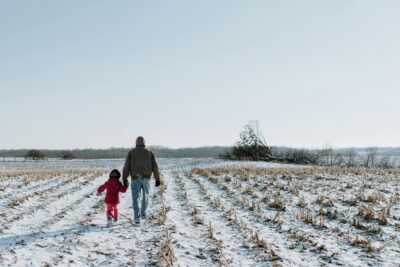

We have nearly 40 years of experience working with farmers. When you contact Farm Aid, our goal is to connect you with helpful services, resources and opportunities specific to your individual needs. Our Farmer Resource Network offers many ways for you to connect.
Hurricane Helene Resources
The destruction that Hurricane Helene left in its 800-mile wake is horrific. Agricultural producers in affected areas have had their farms, livestock, homes and livelihoods swept away, and many lack any form of safety net to soften the blow. If you have been affected by this tragedy, please know that all of us here at Farm Aid are grieving with you.
If you want to talk with one of our Hotline Operators, give us a call at at 1-800-FARM-AID (1-800-327-6243). We answer the Hotline Monday through Friday from 9am – 9pm ET; 6am – 6pm PT. The Spanish Hotline is answered Monday through Friday, 9am – 5pm ET.
Don’t want to call the Hotline? You can also request assistance online. The Hotline Team responds to each request within 24-48 hours.
Our Farmer Resource Network (FRN) is a free search tool that can be used to find organizations and resources across the county. Many of the organizations in the FRN have staff that work directly with farmers on everything from business and finance to growing and marketing. The Network’s media resources include publications, videos, podcasts, training courses and more. Check it out!
Check out our Farmer Resource Guides, created by Farm Aid’s Hotline Team. They’ve compiled the best resources for several important topics including Farm Stress, Disaster Support, Legal Assistance and more.
When disasters strike, our Hotline Team compiles resources to help farmers respond and rebuild. We have nearly 40 years of experience responding to family farmers in the face of devastating impacts from natural disasters like hurricanes, floods, droughts and wildfires, both in the immediate aftermath and on the path to long-term recovery and resiliency. Our resources connect farmers with local, state and national resources to get their farms back up and running.
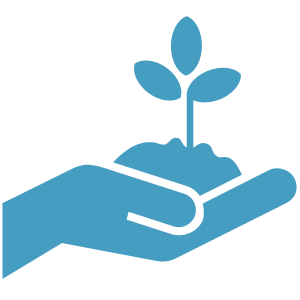
Farm Aid is a member of Cultivemos, a Northeast-based Network of farmers, service providers, mental health professionals and nonprofit workers. It aims to improve mental health awareness, literacy, access and outcomes for farmers, ranchers and farmworkers in the Northeast. This group is working to develop a community that uplifts and connects farmers to one another as well as to mental health resources.
Elizabeth comes to Farm Aid growing up in a Latino household. She graduated from Texas State University with a B.A. in Spanish and a minor in Public Health. She partners with Migrant Clinicians Network as a Health Network Associate and now with Farm Aid as a Hotline Operator for Latinx farmers, hoping to make a difference in the Latinx community. Elizabeth has a passion for helping those in need which has led her to where she is today, working with a team with similar passions. Elizabeth spends most of her free time enjoying the outdoors and spending time with her family and friends.
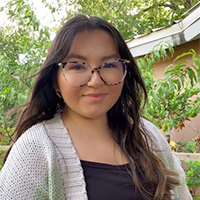
Caitlin (she/her) grew up riding the tractor at her Grandfather’s cherry and apple farm in Eastern Washington state, and has been working in agriculture, farmer organizing, and advocacy since 2006. Caitlin holds a Masters in Sustainable Food Systems with a focus on farmer mental health. She currently lives in Southern Maine with her family, and loves exploring the coastal nooks and crannies, walking in the woods, and growing her garden.

Alexandria comes to the Farm Aid team from a varied background in food systems. Most recently Alexandria worked in the farmers market world where she supported a large network of farmers and producers in the Mid-Atlantic. Her work has also included academic research, policy, and advocacy. Alexandria is constantly inspired by the farmers in this country, and the individuals and organizations that have worked tirelessly to support small scale agriculture, and sustainable and equitable food systems. In her free time Alexandria enjoys biking, reading, listening to music, and sharing good food with friends.
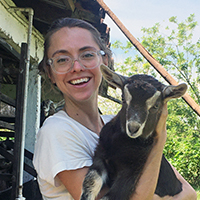
Ashley runs a small produce farm in her home state of Colorado, where she grows vegetables and herbs for a CSA and farm stand. In addition to several years of experience working on urban farms, Ashley also comes to Farm Aid with a background in animal sheltering, veterinary medicine, and emergency response. She is thrilled to be able to help America’s small farmers with their most pressing challenges, so they can continue to care for their land, animals, and themselves. In her free time, Ashley can usually be found outside, doing anything from working on amateur carpentry projects to hiking with her dog, Barney.
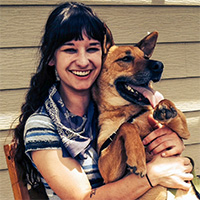
Rachel comes from a long line of family farmers in both North Dakota and Washington. After many years as a teacher, she decided to reconnect with her family’s farming roots. She has worked on a handful of small farms and completed a farmer training with Viva Farms. Along with training to be a farmer, she has trained to be a chaplain and completed a Masters in Theology with a focus on food and farming. She is passionate about supporting diverse family farms and connecting communities with their local food producers.
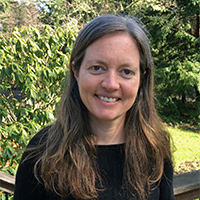
Tony comes to Farm Aid after a career with the Alabama Cooperative Extension System as a farm advisor. Tony holds a Bachelors and Masters of Horticulture and an Education Specialist Graduate degree in Adult Education from Auburn University. Growing up on a farm and working closely with small fruit and vegetable farms in Alabama has given him a passion to help farmers succeed. Currently he is in the process of starting a small blackberry farm with his son.
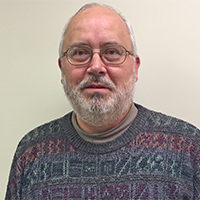
Lori comes to Farm Aid after a three-decade career in private practice audiology, the urgency of climate change prompted a need to change vocations in order to participate more directly in contributing to a solution. She returned to graduate school via Washington State University and emerged in 2019 with an MS in Agriculture with a focus in food systems and agroecology. Since then, she’s worked directly with local family farmers in the agriculturally rich valleys surrounding the Seattle area. Directly supporting farmers and ranchers, especially in this era of great upheaval, is an honor and responsibility she embraces.


